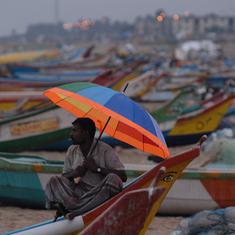Wheat prices rise globally after India bans exports
The rate jumped to 436.25 euros (Rs 35,401.81) per tonne, up by 4.68%, during the intraday trade in the European market.

Wheat prices rose globally on Monday days after India banned its exports to control the domestic rates of the crop, reported AFP.
In the European market, the price of wheat rose to 436.25 euros (Rs 35,401.81) per tonne, up by 4.68% during the intraday trade.
The price of wheat futures climbed by 5.9% to $12.47 half a bushel (9.31 kg) in Chicago, the highest in two months, reported ThePrint.
Futures are financial contracts that allow parties to buy or sell an asset at a predetermined date and price. The parties must buy or sell the asset at the set price on the expiration date regardless of the then market rate.
Global wheat prices had increased on fears of disruption in supply due to Russia’s invasion of Ukraine, which had accounted for 12% of global exports. India had said it was ready to help meet the supply shortages caused by the Ukraine war, according to AFP.
However, India banned the exports on March 13 as wheat production in the country plunged due to a record-breaking heatwave since March.
Making the announcement, India had said that shipments ordered on or before May 13 will be exported. Exports will also be allowed in case permissions are granted by the Indian government to help other countries in meeting their food security needs.
Before Russia’s invasion of Ukraine on February 4, India only accounted for 1% of global wheat exports. Overall, India accounts for 13.53% of the world’s wheat production.
Andrew Whitelaw, a grains analyst at Melbourne-based Thomas Elder Markets, told ThePrint that India’s decision to ban exports would have have been minimal if it was a normal year “but the loss of Ukraine volumes exacerbate the issues.”
On May 14, agriculture ministers from the Group of Seven, or G7, countries had condemned India’s move to ban wheat exports.
“If everyone starts to impose export restrictions or to close markets, that would worsen the crisis,” German Agriculture Minister Cem Ozdemir had said at a press conference. “We call on India to assume its responsibility as a G20 member.”









